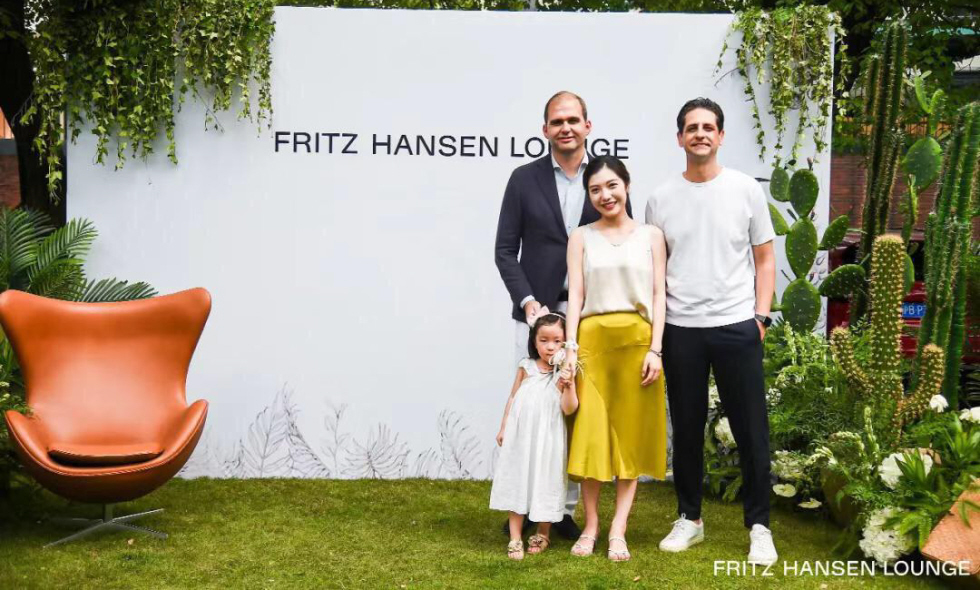Looking, in year 2020, at Shanghai, and from a Nordic perspective in particular Danish activity seems to be incredibly brisk. Their flow of trade-related undertakings are relentless, paired with the very fact that Denmark’s Shanghai mission includes a team of fifty men and women – which speaks volumes about the importance of this hub for business relations and trade between Denmark and China. Consul General Jakob Linulf and Commercial Consul Jesper Halle report on the Danish activities, describe their various efforts, and outline Shanghai’s forward-looking society which has been undergoing huge transformation.
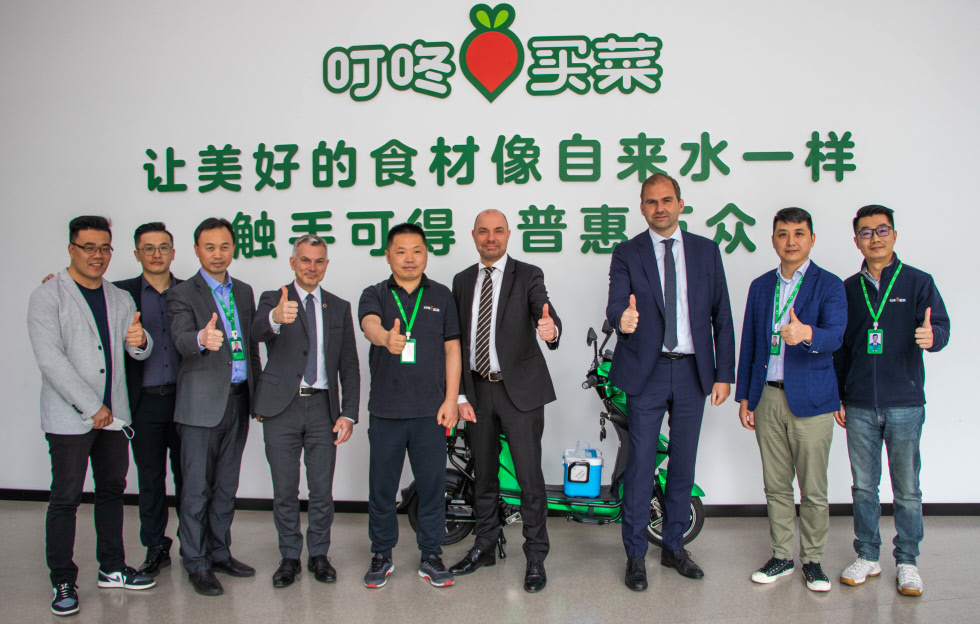
The Consul General has been in China for four years, having started out at the embassy in Beijing, as head of the commercial department. Jakob moved to Shanghai to become the Consul General two years ago. His relatively long career with Denmark’s MFA has mostly focused on trade, including promoting Danish export within the energy efficiency/renewable energy business. The Commercial Consul, meanwhile, has been in Asia for twenty years already; first living in Kuala Lumpur for seven years as an expat, before moving to Shanghai, working for design and construction material companies.
“Jakob brought me on board two years ago to take care of the commercial activities here,” informs Jesper, who heads the Trade Council.
Jesper’s unit works broadly with Danish companies trying to grow their export to China. He also helps those companies who have already invested and have presence in the country.
The Royal Danish Consulate in Shanghai has three additional units: the Innovation Centre, which promotes innovation and education partnerships, working with start-ups, entrepreneurs, tech and new business areas; Invest in Denmark, which works with Chinese companies in trying to get a foothold in Denmark and getting them to invest; and finally the Visa and consular affairs unit.
“On the commercial side we help all kinds of Danish companies, everything from start-ups (firms in Denmark that have things relevant for China’s market) up to companies like Lego, Pandora and so on. It’s a very wide scope but our main focus is on SMEs – something that has become even more important lately, because following the Covid-19 re-opening the Danish government really wanted to push the Danish export for SMEs who have been struggling with their home market and so on. Our task is to help those to open up,” explains Jesper.
“We help with anything from finding distributors and partners, and setting up subsidiaries of Danish companies here, to helping big Danish companies here with government relations, representation and so on.”
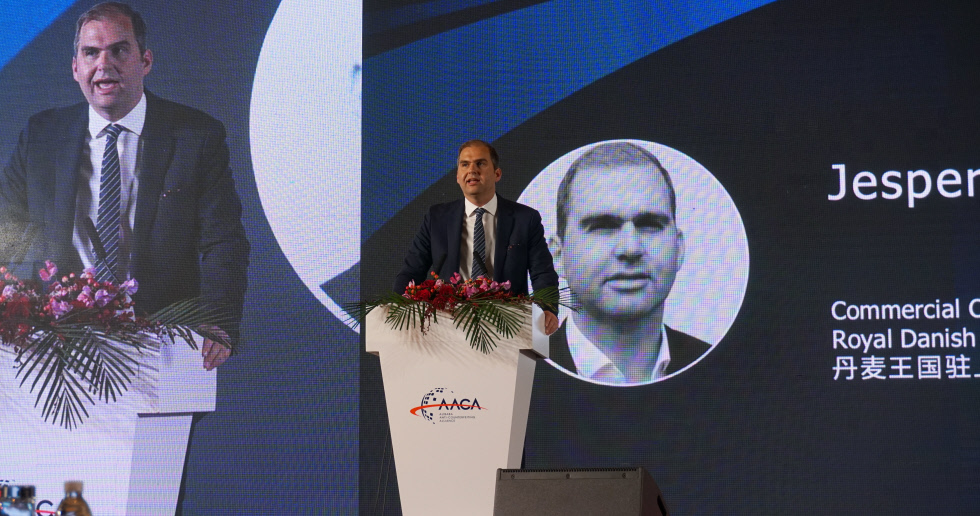
E-commerce focus
While the work is broad, he says their main scope is to find distribution channels for Danish products in the Chinese market, including e-commerce as one of the main focus areas.
“We have during the last few years been looking a lot at the e-commerce channels. Denmark was the first country six years ago to enter into a collaboration agreement with Alibaba group, which basically covers three main areas – one being a red carpet agreement to bring on Danish businesses, to make it easier for those to enter the Alibaba ecosystem which is mainly TMall. Second one is to work on IPR – In China there have traditionally been a lot of challenges relating to intellectually property, so we see it as a very important task for us to liaise between the distribution channel and the Danish companies to solve such issues. Third is to collaborate with Alibaba on marketing and promotions. So, for example, we have a Danish platform on Tmall where we gather all the Danish products/brands to try to generate additional traffic to their products displayed,” explains Jesper.
And one specific service works as an e-commerce tester, where Danish SMEs get help to get to market their product online in China, for a six-month test run. Then they see if each product has the right traction and the right price, without having to do too big an investment, before having to possibly do more “homework” in order to succeed better.
“For this we utilise multi-brand stores that already have very traffic online and place the product in the middle of that traffic to see the reaction. So even though the consumer does not know the brand or is familiar with that product it will still be presented, whereas if a brand comes and open their own shop they will also need to promote it and draw consumers in – which is usually challenging for the brand,” explains Jesper.
“Because we are a government institution we are able to get access on behalf of the Danish companies to certain things that even the big Danish companies usually, and individually, would not be able to obtain. There we play an important role,” he adds.
Aside this, the consulate also does other marketing events, such as online streaming sales promotion broadcasts.
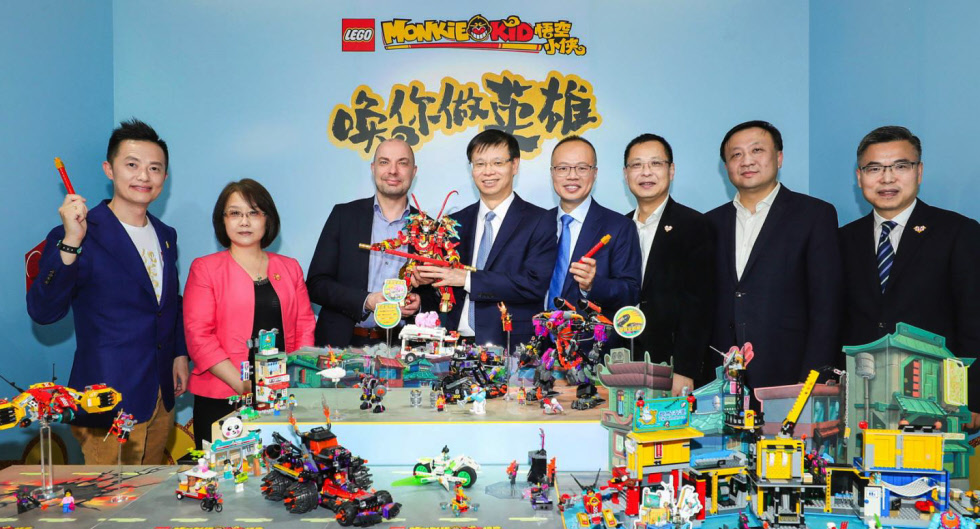
Last-mile delivery ecosystem
The consulate team, as part of Danish programmes, is focusing on the possibilities for Danish companies on Chinese e-commerce platforms but also offline ones, where they can channel more Danish companies through the same setup – to generate more volume. This is their way to manage the significant amount of daily requirements from companies who want to active themselves and who want to do things in China.
To have offline presence, aside online is also necessary for brands, explains Jakob. “Physical stores are often like showrooms, where we are seeing the trend that the Chinese customers would like an experience, but they do not necessarily buy there. They might ask the shop assistance, who will then help to make the purchase online – for home delivery.”
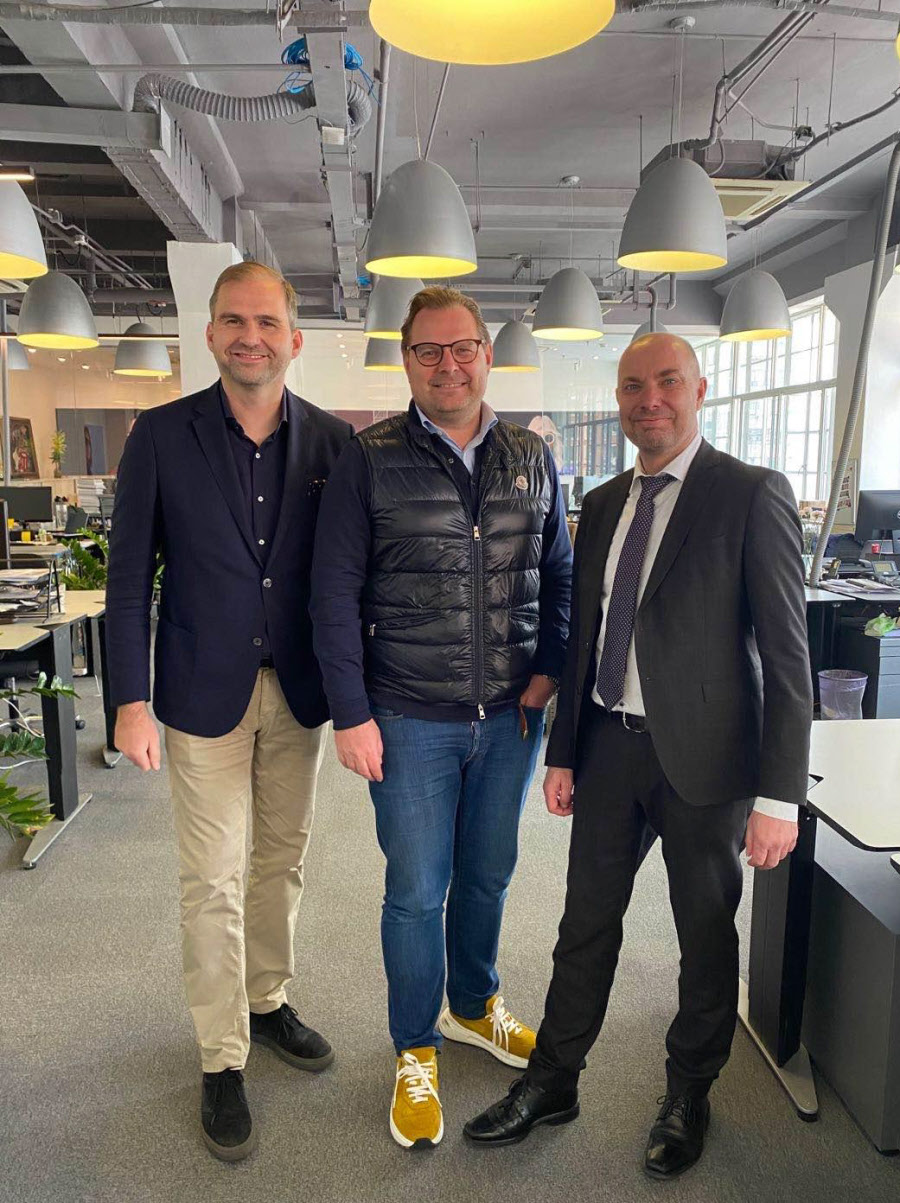
And while talking trends, Jesper tells about so called Key Opinion Customers (KOCs), which many Danish brands are spending marketing budgets on. “It is supposed to be more reliable for the consumers, like a mini KOL (Key Opinion Leader) but a real customer talking about their experience.”
“Now we’ve also started looking at the distribution channels, including collaborations with the companies doing the last mile delivery of food and different services to people. We not only help Danish companies to enter into agreements with platforms, but also with the distribution channels so that various types of Danish food can be delivered through this ecosystem all the way to the consumer’s home. The commercial battle on the e-commerce side has been won by the three big players left, which is Tmall, JD.com and Pinduoduo, but right now the big battle in China is happening in the fine distribution; in the last mile,” adds Jesper.
“We have to monitor these things in order to stay relevant to the Danish companies; to try to get them in there by using the access that we can get as a government body. Recently we entered into collaboration with Dingdong, which is the fastest growing supermarket, but also a large list-mile delivery company in Shanghai, and have already signed up several Danish companies.”
“We have of course been a bit hampered by the fact that Danish companies could not travel to China since Covid-19. So we launched a lot of these initiatives connecting to digital platforms and we have also installed a room with the most modern technology and equipment for holding webinars, online meetings and doing presentations. We can therefore also invite Danish companies to meet their clients online, and we invite Chinese companies to our super facilities to meet Danish companies/partners back in Denmark,” says Consul General Jakob.
“China is one of the countries that you would look for if you are a Danish exporter, because you see an economy being back in gear. We do see Danish companies looking at Shanghai as being one market to grow in.”
Testament to this, bilateral trade between Denmark and China continued to rise despite the pandemic. Danish export to China was already performing well, with an increase of 26 percent throughout the first eight months of 2020.
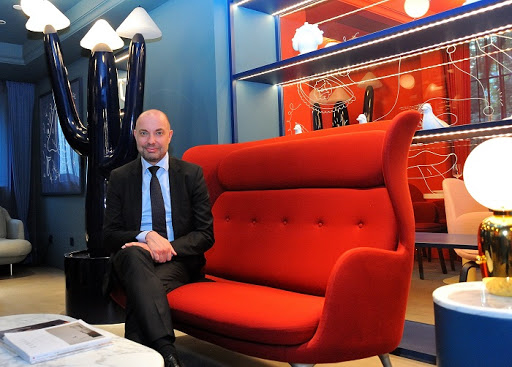
Strong interest in challenging market
The Danish government decided in the spring to reduce by half the fee for Danish Trade Council’s consultancy service, which might also be contributing to increased business with China.
“We are pretty impressed with the aggressiveness with which Danish companies are looking at this market now. We have seen an increase, getting many more enquiries. I think a lot of them would come anyway but the lowered price maybe allows them to be more detailed. Before, they would have allowed us to spend between 10 and 50 hours on an assignment and now they spend more time and are more thorough in what they are doing, and ultimately get a better product,” comments Jesper.
“When the price is lower you are tempted to do more, but you shouldn’t look at China just because of a discount. And it’s also our job to explain to Danish companies that China isn’t something you handle with your left hand. It’s a very challenging market while also the market of opportunities and you can only succeed here if you do it 100 per cent. One really needs to WANT this market and put the necessary resources into it! But of course we also have very good resources here and are able to – I think – give some quite solid advice and hands-on support from the very first idea they have back in Denmark until they have the establishment landed,” adds Jakob
“Our job is also to recommend a company to choose another market instead of China, for instance, and we will do so if we feel that their products are not mature and it’s too risky for them. Ultimately it’s their decision but it’s also our job to advise them. There are certainly steps they can take but the most important thing is that they realise that China is a very big mouthful and that you might have to adjust your product to fit the market. We will also work with them to adjust the product to fit the sales channels,” Jesper fills in.
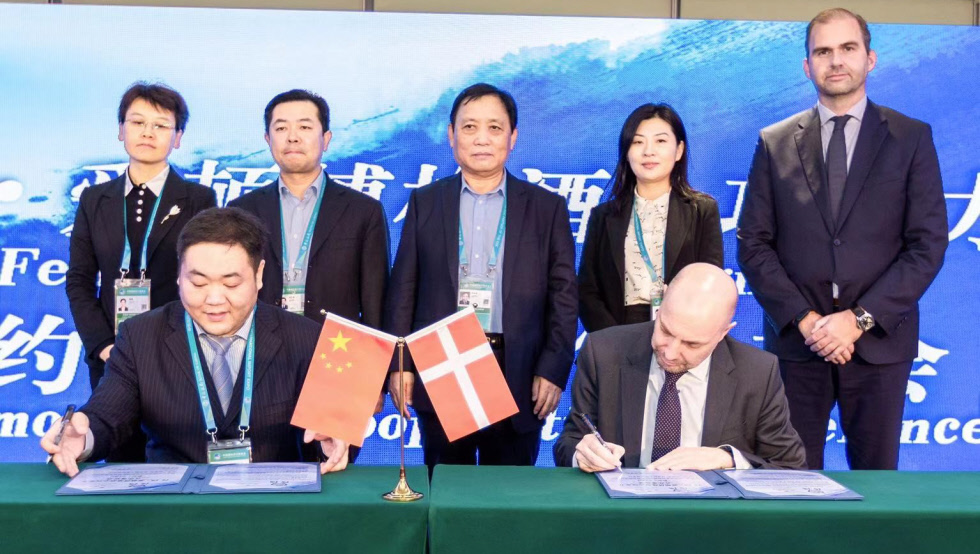
“One of the strengths in Shanghai is how our different agencies work closely as a tightly-knit network to provide the best assistance to Danish companies. We collaborate with the Confederation of Danish Industry (with their incubator facility), the Agriculture and Food council, and the Export Promotion agency, and also with senior Danish businessmen who have been here for many years, to advise us and Danish companies,” emphasises Jakob.
“In non-Covid-19 times we have visitors every day here at the consulate from Danish businesses coming to Shanghai,” says Jesper. In 2020 most meetings are thus taking place online via various platforms.
“And we have a very big conference area used by companies almost every day, doing seminars, workshops, presentations, signings, or in other ways liaising with Chinese stakeholders. So it’s a super active place to be; you really feel that you are in a hotspot now for business.”
Shanghai Klondike
Painting the picture on Shanghai further Jakob says: “It’s just a very dynamic place; an international hub basically. For market access, products approval, contacts to national level authorities the capital of Beijing is of course the hub. In many other ways Shanghai is the hub; an international mega city, with the expat community and the international companies very much present here.”
Jesper adds: “I think you can still feel–having done so for many years already–that you are in a Klondike here; that people are running very fast. There are so many things going on, but I would say that looking at the past five years of development–and which is a pan-China thing–the biggest change we have see in Chinese society is the technologies that have been introduced. For example the mobile payment apps that we now have are integrated with payments, transportation… everything! It’s an incredible technological change of society that has happened here; unbelievable.”
Jakob agrees: “Look at transportation, we have electrical vehicles all over the place now, and with the overall tech revolution, Shanghai is the centre for that. For example, in most hotels you see robots: you don’t have room service people but robots that take care of such deliveries. It’s of course also in response to Covid-19, reducing human contact. But it’s unbelievable to be part of and be living in this city because it’s happening right in front of one’s eyes!”

The Consul General also highlights an effect Covid-19 is having on Chinese people’s lives; which concerns the whole healthy lifestyle and wellbeing sector – now on top of the agenda.
“And that also goes for the green society and the environment so healthy food products, healthcare products and policies to implement a greener society – we see examples of this in Shanghai with a lot of parks, bicycle tracks, amusement parks etc being added. People are exercising much more than they used to. We have also seen improvement in the air quality. All these things also influence what Danish products we try to attract, where we can see that certain products now have a huge market. Therefore, we’re going to focus a lot on what we call the E-health agenda to bring in Danish healthy food and farmer products, outdoor living equipment and so on – all theses thing that we’re quite good at in Denmark.”
And one thing Denmark for sure is good at is design, being world-famous for its furniture. Danish design is available in abundance in Shanghai.
“Especially on product design and furniture design we work with almost all the big Danish names like Fritz Hansen and HAY but there is also a whole group that are less known brands that we are helping to enter, for which there is really a growing market here,” says Jesper.
“We basically spent a lot of effort looking into almost all distribution channels of design products and furniture. We have a list of 80 different companies in China that we are able to hook up the Danish design brands with, and that are specialised in Nordic or Danish design! Those are actually a prime sales channel for them and there are also lots of distributors that typically will also have online channels. We are pretty successful in bringing in those design brands and there’s clearly a change in the Chinese shoppers’ mentality to have cleaner, simplistic design so there is a change in consumer preferences towards something that we can deliver.”
